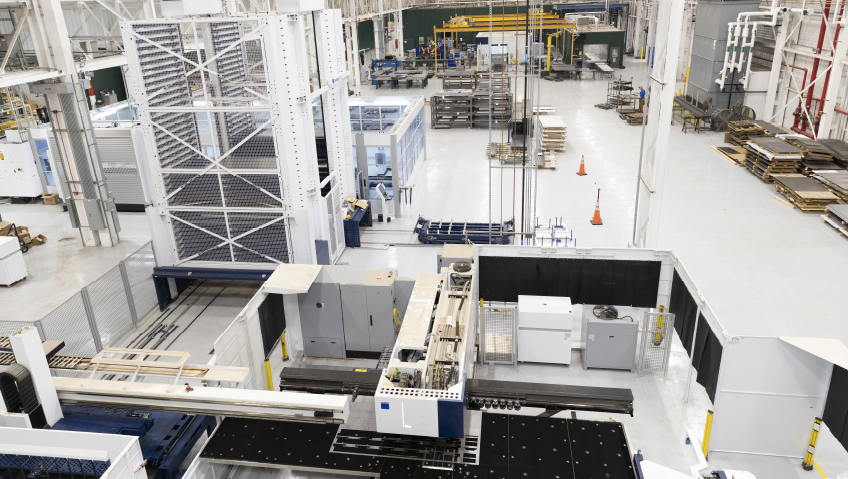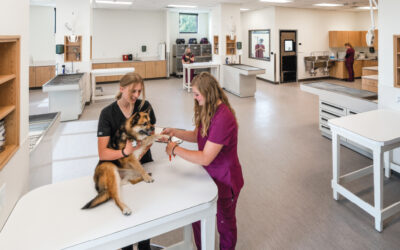Over the past 24 years, Cornerstone Detention Products, Inc. has grown from a two-person business to the largest and most successful company in its sector. “We are classified as a specialty contractor, so we focus on one particular type of construction, and that’s corrections,” explains Charles ‘Mitch’ Claborn. “And we’re growing every day.”
President and Chief Executive Officer of the Alabama-based company, Claborn and his trusted team, including wife Monya, brothers Shannon and Stephen, and children Heath and Heather Lang, have taken Cornerstone from what was essentially a broker in the early days to an industry leader with a staff of over 40 within just five years. Key hires have included COO Joseph Hargrove and CFO David Watts. “They have been a driving force in our growth,” says Claborn. “Their leadership and our vision have allowed us to grow and maintain our focus.”
Key acquisitions
Of the early days, Claborn says that, “We didn’t make anything; we would purchase various parts, then engineer and install those items.” Soon, it made sense to Claborn that the company should grow through a series of strategic acquisitions of businesses that aligned with Cornerstone’s goals and vision, including lock companies, electronics integration providers, metal fabricators, and more. These acquisitions include electronics security company E.O. Integrated Systems, Inc. (EOISI); precast concrete products manufacturer RW Modular; security electronic company Com-Tec; and CM Security Windows. In some instances, acquisitions have included companies under the same umbrella, such as Norment Security Group, Inc., based in Montgomery, Alabama. The acquisition of Norment—which specializes in security electronics integration and detention equipment—also included lock manufacturer Airteq and security electronics division Trentech.
Through its sister company, Claborn Manufacturing, the company provides comprehensive products and solutions, such as custom-designed and manufactured hollow metal doors, ceilings, frames, windows, security furniture, and more for detention centers. And just last year, privately held Cornerstone gained RW Modular, LLC, a well-established and respected contractor and manufacturer specializing in precast concrete products. Often, Cornerstone’s acquisitions also include staff, and Steve Weirich, previous owner and President at RW Modular, joined Cornerstone as Executive Vice President of its new modular division.
For Cornerstone, the purchase of RW Modular made good business sense, as the two worked together for years on detention construction and installation projects. Cornerstone’s “most impactful acquisition,” RW uses molds and fabricates concrete cells on site, up to large quad cell modules, which include four cells in one pour. “They are precast on site, and we set them with a crane,” explains Claborn. “They are not cast-in-place; these are molds we ship from job to job.”
A breadth of expertise
Steadily growing organically and through acquisitions, Cornerstone recently expanded into its new headquarters complex in Tanner, Alabama. Featuring modern offices and new technology including robotic production lines, the facility is where state-of-the-art equipment works alongside the company’s staff of about 280, which includes electrical engineers, mechanical engineers, project managers, construction managers, project coordinators, schedulers, programmers, and welders. Where dozens or even hundreds of the same metal door are being manufactured, robotic welders are used, which speeds up the process.
Working on federal and private prisons across America including state and county men’s facilities as well as facilities for juveniles and women, the company’s portfolio encompasses all manner of correctional and mental health facility projects. For clients, the fact that Cornerstone Detention is responsible for all aspects of construction helps streamline overall operations. “We’re not asking questions of the guy that’s providing the doors and frames—we are already providing them—so we know what we need to do and how to coordinate it,” states Claborn. “It saves the client money, and hopefully puts us in a better position to win more work.”
Indeed, the entire process of building today is different than it was 20 years ago, says Claborn. In the past, owners would hire architects, tell them what they want, and the project would be put out for hard bid. The United States government shifted toward design-build work, which has progressed even further to design-assist. “The reason for that is, the traditional way takes years to bring a job to fruition,” shares Claborn. “With the design-assist method, they can bring a job to fruition and be bidding it or construction getting underway within a year. When interest rates were dropping for years until recently, owners were trying to take advantage of this and get their jobs built while conditions favored them financially. I would say more than 50 percent of the jobs today are design-build-assist or design-build.”
Projects large and small
Taking on large-scale projects including the San Quentin Prison in California’s Marin County, work for the Dallas County Jail, and the 525,000-square-foot Toronto South Detention Centre, Cornerstone is a one-stop shop. Also handing small renovations and ongoing maintenance, Cornerstone has regional offices across the United States, including in Arizona, Texas, North Carolina, and Wisconsin.
“Cornerstone is focused on new construction, but we have regional service and supply groups doing the follow-up calls, replacement parts, and small renovations,” Claborn explains. “We do a lot of local renovations. We may come in and replace three doors for them with that service group and have a national service and supply organization taking care of the customers after we build the job initially.” For example, the company has been handling the maintenance contract for the Arizona Department of Corrections for the past 25 years and has embedded technicians going to some facilities every day.
Since 1998, Cornerstone has nurtured relationships with many of the world’s top construction companies abroad and at home, including Balfour Beatty, J.E. Dunn, Caddell, EllisDon and Bird Construction, Inc. One of the most recent projects between Cornerstone and Bird Construction was the accelerated build at the Kenora Jail and Thunder Bay Correctional Centre in Ontario. Recently completed, the project took about 18 months from start to finish.
Cornerstone is also involved with the construction of the New Toronto Courthouse project, just north of City Hall. Amalgamating six Ontario Court of Justice criminal courthouses into a single location, the 17-storey structure will feature state-of-the-art audio and video conferencing systems in a barrier-free environment. Working with EllisDon once again—the two teamed up for the Toronto South Detention Centre—the project reflects the respect both companies have earned in the construction industry. “There are a few companies in Canada that do what we do but they are smaller, so when there are large projects in Canada, we get called in,” says Claborn. The company is so specialized, it was recently called upon for a lock project in Egypt for two prison facilities.
Closer to home, Cornerstone is busy with other works, including modular jobs in Alabama, and another in Missouri’s Jackson County, which the company feels will accelerate its growth trajectory and enable it to make additional acquisitions.
Looking ahead
Continuing to earn new and repeat business, Cornerstone’s reputation speaks for itself. Listed on the Inc. 5000 for the past several years and recognized as one of the top subcontractors in the state of Alabama, the company keeps growing. A fully active member of the American Subcontractors Association, the company also benefits from the support the ASA provides.
As for the future of Cornerstone, its founder says the sky is the limit. Like many types of construction, corrections is a sector that is evolving to meet the needs of tomorrow. “We are seeing a meaningful transformation from our correctional facilities into mental health facilities,” states Claborn. “I think it’s long overdue.” The transformation, he says, is taking place in new design-build projects, specifically in Canada. “They are trying to normalize buildings, take away the institutional look, and give it more of a normal look—even though it’s secure—to kind of change the mindset of the inmate or patient. There’s something wrong if you want to commit a crime, so it starts with mental health, so there’s a big transformation into that field. But at the end of the day, my job is to protect the people who work there along with the patient. We want it to be a safe working environment where they get their treatment.”
Looking forward to 2023 and the 25th anniversary of Cornerstone Detention, Claborn says plans are in the works. He still vividly recalls the company’s 10th anniversary, held at the NASA museum in Huntsville, Alabama. The space boasts a large mural of the moon on the floor. “So we danced on the moon that night.”













